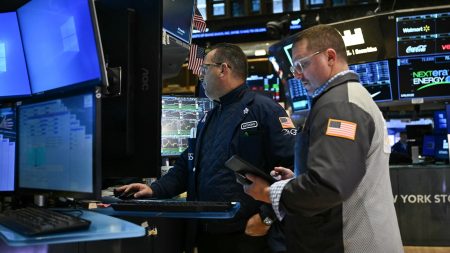Asian Stocks Surged on Strong U.S. Market Performance
The Asian stock market experienced a significant surge, driven by the robust performance of U.S. markets, which were nearing record highs. Hong Kong’s Hang Seng index saw a remarkable rise of 3.69% to 22,620.33, while the Shanghai Composite index also increased by 0.43% to 3,346.72. However, Japan’s Nikkei 225 dipped 0.79% to 39,149.43, attributed to a stronger yen impacting investor sentiment. Despite President Trump’s tariff threats, investors remained focused on positive U.S. market trends, weaker dollar, and lower Treasury yields, creating a favorable environment for risk assets. This rally highlighted the global influence of U.S. market dynamics on Asian markets, underscoring the interconnected nature of financial markets.
China’s Tech Sector Leads the Charge
China’s technology sector emerged as a key driver, with significant gains for major tech firms like Tencent, Xiaomi, Alibaba, and Meituan. This surge was fueled by advancements in artificial intelligence, following the release of DeepSeek’s AI model, which competes with OpenAI’s technology at a lower cost. Companies such as Alibaba and Baidu also showcased their AI capabilities, with Baidu announcing free public access to its Ernie Bot chatbot. Experts noted a paradigm shift, as investors increasingly recognize China’s potential in AI, moving beyond stimulus-driven growth to innovation-led expansion. This shift signifies a strategic pivot towards technology and innovation, positioning China as a global player in AI.
European Markets Show Cautious Optimism
European markets exhibited mixed performance, with slight gains for France’s CAC 40 and declines for Germany’s DAX and Britain’s FTSE 100. This cautious sentiment followed record highs earlier in the week, influenced by hopes for a Ukraine peace deal. The mixed reaction reflected uncertainty and cautious optimism, as investors weighed geopolitical developments against economic fundamentals. The slight dips in key indices indicated a pause after recent rallies, highlighting the delicate balance of investor confidence.
U.S. Stocks Near Record Highs Influence Global Markets
U.S. markets continued their strong rally, with the S&P 500 nearing its all-time high, the Dow Jones Industrial Average gaining 342 points, and the Nasdaq Composite surging 1.5%. This upward momentum was supported by positive earnings reports and economic data, with officials indicating that reciprocal tariffs would take longer to implement. The U.S. market’s resilience and record highs have been a significant driver of global market sentiment, influencing investor decisions across regions. This performance underscores the enduring strength of U.S. equities and their role in shaping global financial trends.
Energy Prices and Currency Movements Impact Global Markets
Energy prices saw moderate increases, with U.S. crude rising to $71.44 per barrel and Brent crude reaching $75.40 per barrel. In currency markets, the U.S. dollar weakened against the yen, reflecting shifting investor risk appetites. These movements impact global trade and commodity pricing, influencing inflation and economic stability. The weaker dollar particularly affects emerging markets and commodity exporters, highlighting the complex interplay of currency dynamics in global economics.
The Bigger Picture: A Shift in Market Dynamics
The recent market movements highlight broader shifts in global financial dynamics, with a growing focus on technology and innovation, particularly in China. The U.S. market’s influence resembles a ripple effect, driving Asian and European trends. Investors are increasingly recognizing the potential of AI and technology in reshaping industries, signaling a move towards innovation-driven growth. This trend suggests a strategic realignment of global investment, emphasizing technology and innovation over traditional stimulus measures. As markets continue to evolve, this shift underscores the importance of adaptability and forward-thinking in investment strategies.















